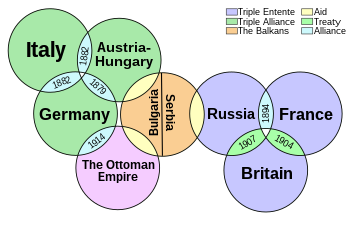
Germany entered into World War I on August 1, 1914, when it declared war on Russia. In accordance with its war plan, it ignored Russia and moved first against France–declaring war on August 3 and sending its main armies through Belgium to capture Paris from the north. The German invasion of Belgium caused Britain to declare war on Germany on August 4. Most of the main parties were now at war. In October 1914, the Ottoman Empire joined the war on Germany's side, becoming part of the Central Powers. Italy, which was allied with Germany and Austria-Hungary before World War I, was neutral in 1914 before switching to the Allied side in May 1915.
Historians have vigorously debated Germany's role. One line of interpretation, promoted by German historian Fritz Fischer in the 1960s, argues that Germany had long desired to dominate Europe politically and economically, and seized the opportunity that unexpectedly opened in July 1914, making Germany guilty of starting the war. At the opposite end of the moral spectrum, many historians have argued that the war was inadvertent, caused by a series of complex accidents that overburdened the long-standing alliance system with its lock-step mobilization system that no one could control. A third approach, especially important in recent years, is that Germany saw itself surrounded by increasingly powerful enemies – Russia, France and Britain – who would eventually crush it unless Germany acted defensively with a preemptive strike.[1]
- ^ Mark Hewitson. Germany and the Causes of the First World War (2004) pp. 1–20.